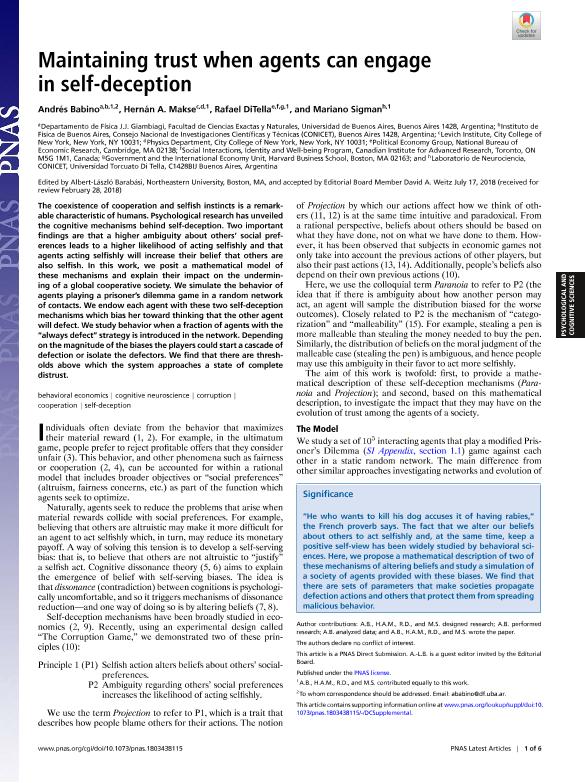Mostrar el registro sencillo del ítem
dc.contributor.author
Babino, Andrés

dc.contributor.author
Makse, Hernán Alejandro

dc.contributor.author
Acosta Martínez, Delvis Rafael

dc.contributor.author
Sigman, Mariano

dc.date.available
2020-03-06T20:01:35Z
dc.date.issued
2018-08
dc.identifier.citation
Babino, Andrés; Makse, Hernán Alejandro; Acosta Martínez, Delvis Rafael; Sigman, Mariano; Maintaining trust when agents can engage in self-deception; National Academy of Sciences; Proceedings of the National Academy of Sciences of The United States of America; 115; 35; 8-2018; 8728-8733
dc.identifier.issn
0027-8424
dc.identifier.uri
http://hdl.handle.net/11336/98980
dc.description.abstract
The coexistence of cooperation and selfish instincts is a remarkable characteristic of humans. Psychological research has unveiled the cognitive mechanisms behind self-deception. Two important findings are that a higher ambiguity about others’ social preferences leads to a higher likelihood of acting selfishly and that agents acting selfishly will increase their belief that others are also selfish. In this work, we posit a mathematical model of these mechanisms and explain their impact on the undermining of a global cooperative society. We simulate the behavior of agents playing a prisoner’s dilemma game in a random network of contacts. We endow each agent with these two self-deception mechanisms which bias her toward thinking that the other agent will defect. We study behavior when a fraction of agents with the “always defect” strategy is introduced in the network. Depending on the magnitude of the biases the players could start a cascade of defection or isolate the defectors. We find that there are thresholds above which the system approaches a state of complete distrust.
dc.format
application/pdf
dc.language.iso
eng
dc.publisher
National Academy of Sciences

dc.rights
info:eu-repo/semantics/openAccess
dc.rights.uri
https://creativecommons.org/licenses/by-nc-sa/2.5/ar/
dc.subject
BEHAVIORAL ECONOMICS
dc.subject
COGNITIVE NEUROSCIENCE
dc.subject
COOPERATION
dc.subject
CORRUPTION
dc.subject
SELF-DECEPTION
dc.subject.classification
Otras Ciencias Naturales y Exactas

dc.subject.classification
Otras Ciencias Naturales y Exactas

dc.subject.classification
CIENCIAS NATURALES Y EXACTAS

dc.title
Maintaining trust when agents can engage in self-deception
dc.type
info:eu-repo/semantics/article
dc.type
info:ar-repo/semantics/artículo
dc.type
info:eu-repo/semantics/publishedVersion
dc.date.updated
2020-03-05T14:59:44Z
dc.journal.volume
115
dc.journal.number
35
dc.journal.pagination
8728-8733
dc.journal.pais
Estados Unidos

dc.description.fil
Fil: Babino, Andrés. Consejo Nacional de Investigaciones Científicas y Técnicas; Argentina. Universidad de Buenos Aires. Facultad de Ciencias Exactas y Naturales. Departamento de Física; Argentina
dc.description.fil
Fil: Makse, Hernán Alejandro. City College of New York. Levich Institute; Estados Unidos
dc.description.fil
Fil: Acosta Martínez, Delvis Rafael. Harvard University; Estados Unidos. Consejo Nacional de Investigaciones Científicas y Técnicas; Argentina. Canadian Institute for Advanced Research; Canadá
dc.description.fil
Fil: Sigman, Mariano. Universidad Torcuato Di Tella; Argentina. Consejo Nacional de Investigaciones Científicas y Técnicas; Argentina
dc.journal.title
Proceedings of the National Academy of Sciences of The United States of America

dc.relation.alternativeid
info:eu-repo/semantics/altIdentifier/url/http://www.pnas.org/lookup/doi/10.1073/pnas.1803438115
dc.relation.alternativeid
info:eu-repo/semantics/altIdentifier/doi/http://dx.doi.org/10.1073/pnas.1803438115
Archivos asociados
